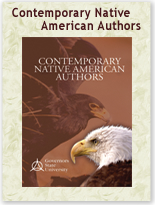|
OVERVIEW
The course is driven by 21 videotapes and a Teleclass Study Guide. The Study Guide contains a list of books the student will need to read for this course, and includes traditional stories and excerpts of Native American Indian writings that supplement the lessons. The videotapes feature renowned Native American authors who share their knowledge and wisdom in interviews. A common theme of the discussions contains content in which the writers practice their craft, and what it means to be a Native American author.
Course Materials
Text: Contemporary Native American Authors, Teleclass Study Guide, by J.Kilpatrick, Ph.D., University Park,IL: Governor State University, 1997
Course Lesson Descriptions
Class 1: Course Overview
Students are introduced to course content and the course’s studio class members.
Class 2: Guest author, Gayle Ross
Ms. Ross is the direct descendent of Principle Chief John Ross, who was the leader of the Cherokee Nation at the time of the Removal ( "Trail of Tears"). She is a very well-respected storyteller, an expert on oral tradition, and the author of several editions of Cherokee stories.
3 and 4: Guest author, Louis Owens
Dr. Owens is of mixed-blood descent (Choctaw/Cherokee/Irish/Welsh/Cajon) and currently serves as Professor of Literature at the University of New Mexico (Albuquerque). Among his novels is Other Destinies, which is featured in one of the two tests for this course. In addition, he has penned numerous critical essays, articles and texts. Some of the topics covered in this class include the commoditization of Native American identity, the "erotics of desire" and the concept of mixed-blood identity.
5 and 6: Guest author, Betty Louise Bell
Dr. Bell (Cherokee) is a professor at the University of Michigan (Ann Arbor). Intriguing topics covered in her interviews include "An Indian with a pen," the "The lost generation", and the power of oral storytelling and its relationship to Native American writing.
Class 7: Guest author, Joy Harjo
Joy Harjo (Muskogee Creek) is a poet, scriptwriter, editor, filmmaker, and musician. She also holds the position of Professor of Literature at the University of New Mexico (Albuquerque). Topics of discussion include the relationship between poetry and oral traditions, urban Indian poetry, and the art of teaching poetry.
Class 8: Guest author, Luci Tapahonso
Luci Tapahonso (Navajo) is a professor at the University of Kansas (Lawrence) and a very well-respected poet in her own right. Topics covered in this discussion include the matriarchal structure of Navajo culture, the nature of American Indian poetry, andthe ways in which Navajo readers – both children and adults – can feel more empowered through literature targeted to them.
Class 9: Guest author, James Welch
James Welch (Blackfoot/Gros Ventre) is an internationally respected poet and novelist. Topics covered in this class include the power of the word, the nature of the women in Winter in the Blood, and the importance of names and family history.
10 and 11: Guest author, Susan Power
Susan Power (Dakota/German) is the author of the national best-seller, The Grass Dancer. Ms. Power is originally from Chicago, and holds both undergraduate and law degrees from Harvard. Topics covered in this class include Indian boarding schools, the religious impact of Christianity on American Indians, an author’s relationship to "place", and the occasional aggressiveness of white "helpers." James Welch also makes a reappearance in this class via telephone.
12 and 13: Guest author, Sherman Alexie
In these classes, students discuss the works of Sherman Alexie (Spokane/Coer d’Alene), a poet and novelist from the state of Washington. Topics include the politics of writing, a debate on the "cynical" and/or "funny" style of Alexie’s writing, and a discussion of the responsibilities inherent in writing from an ethnic viewpoint.
14 and 15: Guest author, Linda Hogan
Linda Hogan (Chickasaw) is a poet and novelist of immense talent. She teaches at the University of Colorado and is an environmental activist. She is a major force in the development of written Native American poetry, a well-respected fiction writer, an environmental essayist, and an award winning dramatist. Topics covered include the many uses of fiction and non-fiction writing.
16 and 17: Guest author, Thomas King
homas King (Cherokee/Greek) has been described as a "Native American Kurt Vonnegut" and a "darkly funny Mark Twain". He is a former photo-journalist and currently works as a university professor, scriptwriter, novelist, and author of children’s books. Topics covered in theses classes include King’s description of the differences between print and film media, comments on the making of this course’s video, the definition of "meta-discourse", a discussion on stereotypes, a discussion on the uniquely feminist nature of Mr. King’s work, and the nature of "Tricksters".
18 and 19: Guest author, A. A. Carr
Mr. Carr (Laguna/Navajo) is an author and successful filmmaker. Short segments of his documentary Laguna Women are used in these two class sessions. A few weeks after this telecourse was made, Navajo Code Talkers, a National Geographic documentary produced by Lena and Aaron Carr, won an Emmy for best documentary. Other topics include a discussion on the issue of "identity", a discourse on the impact of using a white protagonist in an Indian novel, and Carr’s point of view with respect to the writer’s "responsibility to build upon what other authors have done."
20 and 21: Guest author, Gerald Vizenor
Gerald Vizenor is Professor of Native American Studies at the University of California (Berkley). He has been described by LaVonne Brown Ruoff as a "compassionate trickster", a "formidable warrior in the word wars", a superb storyteller, and a keen observer of our often hypocritical modern society. Topics covered include further discussion on the "Trickster", the nature of violence, "shadow words", Vizenor’s definition of what constitutes a meaningful question, and why an author’s response to a question often takes the form of a story. |




